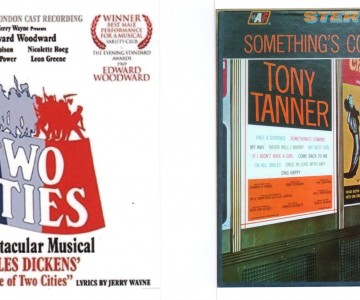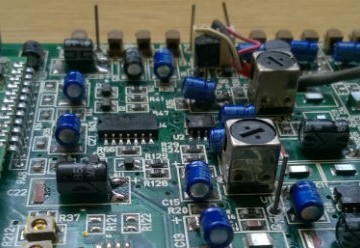01277 225316 info@audiorestored.com
Multi-Track Reel-to-Reel Tape (1/4", 1/2", 1", 2") - Audio Restored
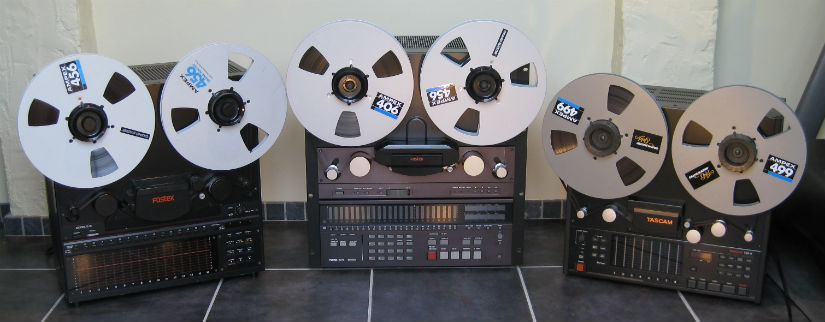
Fostex E-16 / Fostex G-24 / Tascam TSR-8
Prices
| 1/4 inch 4-track tape (10.5″ reel) | £55 / reel |
| 1/4 inch 8-track tape (7″ reel) | £65 / reel |
| 1/2 inch 2-track tape (10.5″ reel) | £50 / reel |
| 1/2 inch 4-track tape (10.5″ reel) | £65 / reel |
| 1/2 inch 8-track tape (10.5″ reel) | £70 / reel |
| 1/2 inch 16-track tape (10.5″ reel) | £80 / reel |
| 1 inch 4-track tape (10.5″ reel) | £65 / reel |
| 1 inch 8-track tape (10.5″ reel) | £70 / reel |
| 1 inch 16-track tape (10.5″ reel) | £85 / reel |
| 1 inch 24-track tape (10.5″ reel) | £90 / reel |
| 2 inch 2- to 4-track tape (10.5 inch reel) | £60 / reel |
| 2 inch 2- to 4-track tape (14 inch reel) | £70 / reel |
| 2 inch 8-track tape (10.5 inch reel) | £70 / reel |
| 2 inch 8-track tape (14 inch reel) | £80 / reel |
| 2 inch 16-track tape (10.5 inch reel) | £85 / reel |
| 2 inch 16-track tape (14 inch reel) | £95 / reel |
| 2 inch 24-track tape (10.5 inch reel) | £95 / reel |
| 2 inch 24-track tape (14 inch reel) | £105 / reel |
| (Prices include baking) | |
| Baking only (no digitisation) (1/4″) 7″ & 10.5″ reels | £20 for 1 to 4 reels |
| Baking only (no digitisation) (1/2″, 1″ & 2″) 10.5″ & 14″ reels | £40 for 1 to 4 reels |
Multi-track facts
- Multi-track analogue tape recording dates back to 1955 when Ampex developed and released the first 8 track recorder on 1 inch tape.
- Building on this early success, multi-track recorders became available in 1/4 inch, 1/2 inch and 2 inch formats, ranging from 4-track through to 24 track capability.
- By the 80s and 90s, 24-track studio recordings were commonplace, and indeed, some multi-track recorders were portable enough to be taken to venues to make live recordings of singers and bands for subsequent mix-down in a studio.
Obtaining the individual tracks (stems)
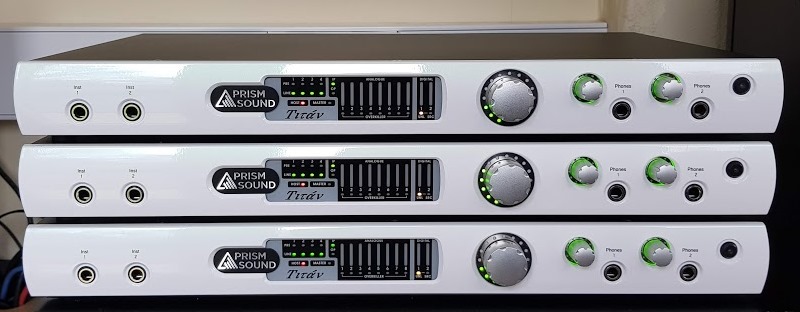
With all multi-track reels, the tape is played through once, and all analogue outputs are routed simultaneously to a bank of three Prism Sound ‘Titan’ AD/DA converters, then via a Red Net PCIe-R audio card, to produce the raw tracks (stems) as individual .wav files which are saved to a dedicated solid-state drive (SSD).
The synchronised stems can either be supplied on a new (or the clients’ own) memory stick or hard-drive, or can be uploaded via ‘We Transfer‘.
Any sampling rate can be accommodated – from 16 bit 44.1 kHz (standard CD quality) up to 24 bit 192 kHz – just let us know your preference beforehand.
Sticky Shed Syndrome (SSS)
Many studio tapes that we receive for transfer are affected to some degree by Sticky Shed, a noticeable ‘squealing’ sound as the tape is played, often accompanied by excessive wow and flutter and the shedding of sticky iron oxide particles on the record / playback heads and pinch roller.
The most common offenders are Ampex 406/407, 456/457, 499, and the ‘Grand Master’ consumer/audiophile back-coated tapes.
Some ‘pro’ tapes (manufactured by Scotch/3M) can also be afflicted, including 206/207, 226/227, 808, and 986 as well as audiophile tapes such as “Classic” and “Master-XS”
SSS is caused by moisture-initiated breakdown of the binder holding the iron oxide particles to the base tape, Due to the unpredictable nature of the problem, we always bake studio tapes prior to transfer without exception. Baking quarter inch tapes at an accurately controlled 55 degrees C for 8 – 10 hours (12 – 18 hours for half- and one inch tapes), drives out the moisture in a slow and controlled way, allowing us to retrieve and transfer the recorded content to digital.
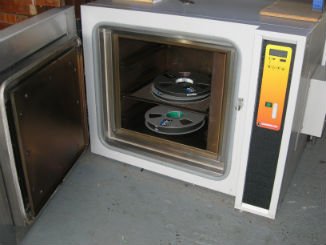 At Audio Restored, we use a Carbolite type 201 laboratory oven (with over-temperature safety cut-out) to ‘bake’ tapes suffering with SSS.
At Audio Restored, we use a Carbolite type 201 laboratory oven (with over-temperature safety cut-out) to ‘bake’ tapes suffering with SSS.
Be advised – never attempt to play any tapes exhibiting SSS – it may well destroy the tape and its recorded content.
Contact us to discuss a solution.
The principle behind analogue tape-based multi-tracking, is the simultaneous recording of separate sounds (e.g. guitars, bass, drums, keyboards, lead / backing vocals etc.) onto discrete tracks on the tape as it moves past the recording head. When played back, the individual sounds are reproduced simultaneously from the tape, giving perfectly synchronised audio. The resultant multi-track recording can be mixed and re-mixed until the desired sound is achieved.
Due to the ever-increasing demand for transferring multi-track tapes to discrete digital .wav files, we have furnished a second studio dedicated to all types of multi-track transfer, from 4-track to 24-track, 1/4 inch to 2 inch, 7.5 ips to 30 ips.
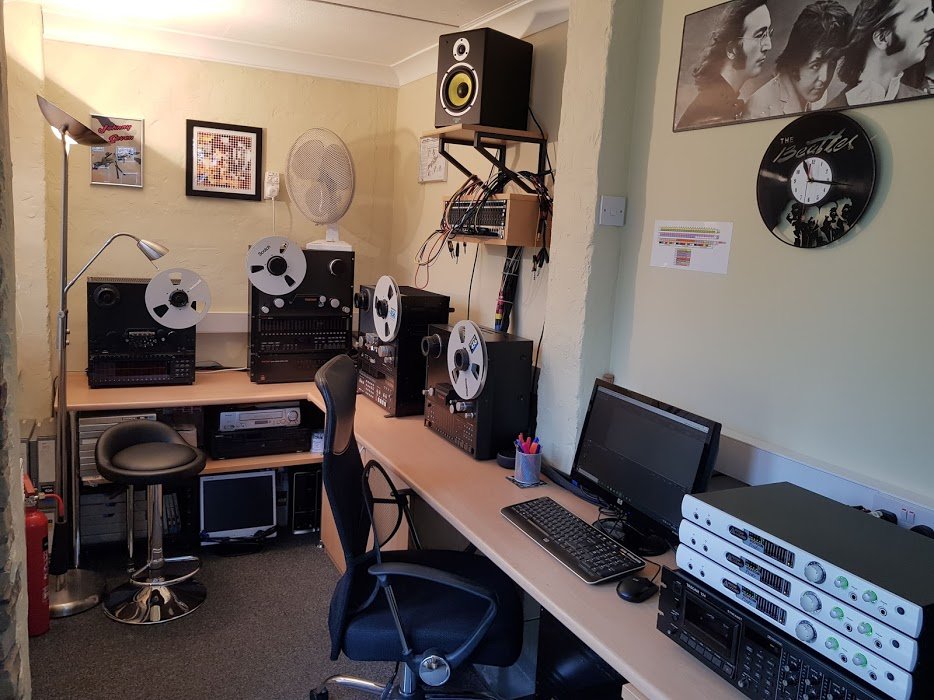
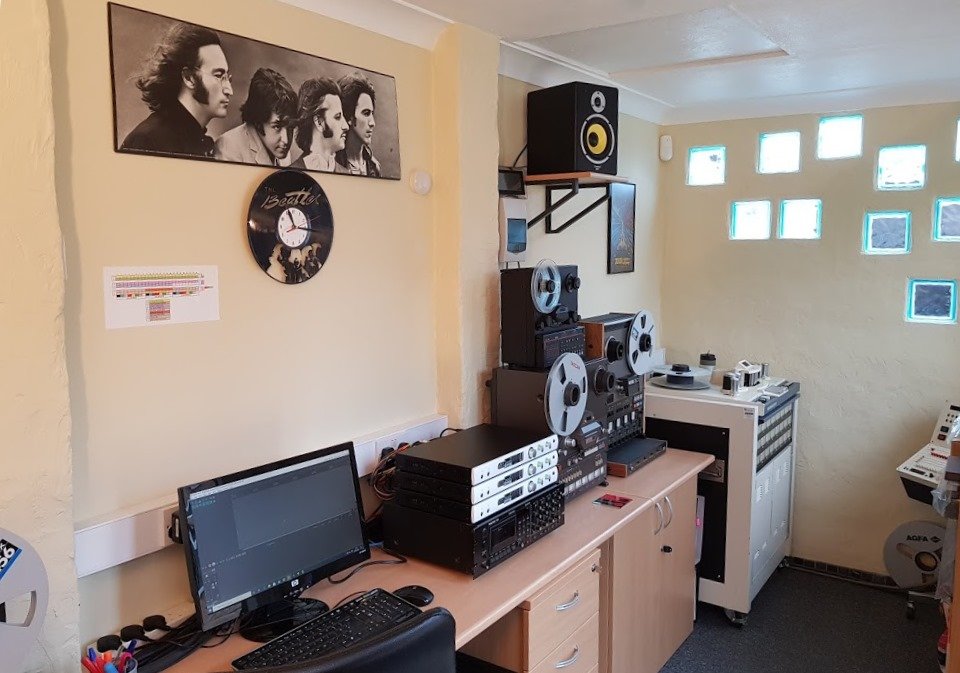
The Process:
With all multi-track tape reels (see below), each individual track is lifted simultaneously in one play-through, and all analogue outputs are routed to a bank of three Prism Sound ‘Titan’ AD/DA converters, then via a Red Net PCIe-R audio card, to produce the raw tracks (stems) as individual .wav files at up to 24 bit / 192 kHz sampling rate. Finally the synchronised files are saved to the customers’ own flash drive or HD. Alternatively, we can supply a new USB-3 memory stick, or the files can be sent directly to the client for download using ‘We Transfer’.
In this way, unique recording sessions from the past can now be recovered to a format which permits re-mixing and mastering by the client using software such as Cubase, Pro-Tools or Reaper.
4-Track 1/4 inch Tape
These studio recordings are received on 7 or 10.5 inch reels, and are 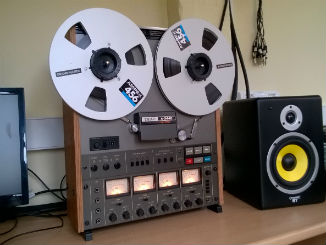 transcribed on a TEAC A-3440 4-channel multi-track tape deck (‘Simul-Sync’), running at either 7.5 or 15 ips.
transcribed on a TEAC A-3440 4-channel multi-track tape deck (‘Simul-Sync’), running at either 7.5 or 15 ips.
If dbx type 1 encoding was used during the original recording, a four-channel dbx type-1 noise reduction unit (TEAC RX-9) is used to decode the signals during the transfer process.
8-Track 1/4 inch Tape
These studio recordings are received on 7 inch reels, and are transcribed on a Fostex R8 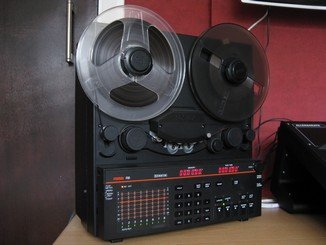 8-track open-reel tape deck running at 15 ips.
8-track open-reel tape deck running at 15 ips.
The Dolby C noise reduction facility is included on this deck, and if this was used during the recording process, it will be used during transcription, to obtain the optimal noise-free transfer.
8-Track 1/2 inch Tape
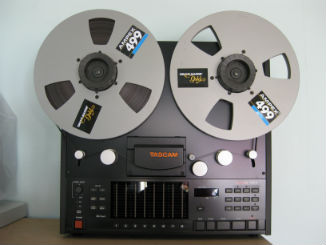
These studio recordings are received on 10.5 inch reels, and are transcribed on a Tascam TSR-8 8-track open-reel tape deck running at 15 ips.
If the original recording was encoded for dbx type I noise reduction, this will be decoded during transcription.
16-Track 1/2 inch Tape
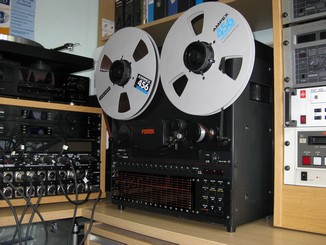
By far, the most common multi-track format we transfer, these 16-track studio recordings are received on 10.5 inch reels, and are transcribed either on a Fostex E-16 16-track open-reel tape deck, or a Fostex G16s deck, both running at 15 ips.
The E16 allows for Dolby C noise reduction, while the G16s facilitates Dolby S – if either of these NR systems were used during the original recording, they will be used during transcription.
8-, 16- and 24-Track 1 inch Tape
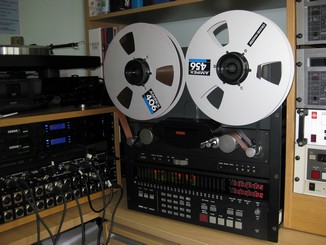
These studio recordings are received on 10.5 inch reels, and are transcribed on either a Fostex G24s or a Tascam MSR 24 24-track open-reel tape deck running at 15 ips, catering for both Dolby S and dbx type I noise reduction. Accurate track mapping is employed to obtain the 8 or 16 tracks using a 24-track p/b head.
8, 16- and 24-track 2 inch Tape
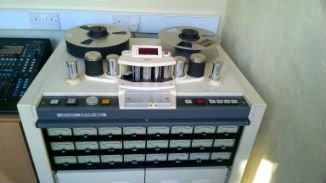 These studio recordings are received on 10.5 inch or 14 inch reels, and are transcribed on an Otari MTR 90 II 24-track open-reel tape deck running at 15 or 30 ips. Accurate track mapping is employed to obtain the 8 or 16 tracks using a 24-track p/b head.
These studio recordings are received on 10.5 inch or 14 inch reels, and are transcribed on an Otari MTR 90 II 24-track open-reel tape deck running at 15 or 30 ips. Accurate track mapping is employed to obtain the 8 or 16 tracks using a 24-track p/b head.
Contact us to discuss your requirements fully.


